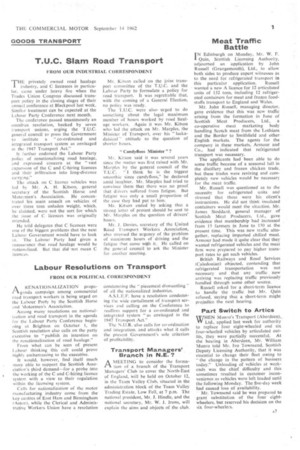T.U.C. Slam Road Transport
Page 9

If you've noticed an error in this article please click here to report it so we can fix it.
FROM OUR INDUSTRIAL CORRESPONDENT
THE privately owned road haulage industry, and C licensees in particular, came under heavy fire when the Trades Union Congress discussed transport policy in the closing stages of their annual conference at Blackpool last week. Similar treatment can be expected at the Labour Party Conference next month.
The conference passed unanimously an omnibus resolution, backed by seven transport unions, urging the T.U.C. general council to press the Government to institute a "co-ordinated and integrated transport system as envisaged in the 1947 Transport Act."
It further endorsed the Labour Party policy of renationalizing road haulage, and expresSed concern at the " vast expansion of the C and C-hiring licences and their infiltration into long-distance carrying."
The attack on C licence vehicles was led by Mr. A. H. Kitson, .general secretary of the Scottish Horse and Motormen's Association. Be concentrated his main assault on vehicles of over three tons unladen weight, which, he claimed, were not the sort for which the issue of C licences was originally intended.
He told delegates that C licences were one of the biggest problems that the next Labour Government would have to look at. The Labour Party had given a reassurance that road haulage would be nationalized. But that did 'not mean C licences. Mr. Kitson called on the joint transport committee of the T.U.C. and the Labour Party to formulate a policy for road transport. It was regrettable that, with the coming of a General Election, no policy was 'ready.
The T.U.C. were also, urged to do something about the legal maximum number of hours worked by road haulage workers. Again it was Mr. Kitson who led the attack on Mr. Marples, the Minister of Transport, over his "lackadaisical" attitude to the question of shorter hours.
Candyfloss Minister " ?
Mr. Kitson said it was several years since the matter was first raised with Mr. Marples by the general council of the T.U.C. " I think be is the biggest smoothie since candyfloss," he declared amid laughter. Mr. Marples had tried to convince them that there was no proof that drivers suffered from fatigue. But fatigue was only a small proportion of the case they had put to him.
Mr. Kitson ended by asking that a strong letter cif protest should be sent to Mr. Marples on the question of drivers' hours.
Mr. J. Davies, secretary of the United Road Transport Workers Association, also stressed the urgency of the problem of maximum hours of driving and the fatigue that came' Op it. He called on the general council to ask the Minister for another meeting.
















































































































































































































































